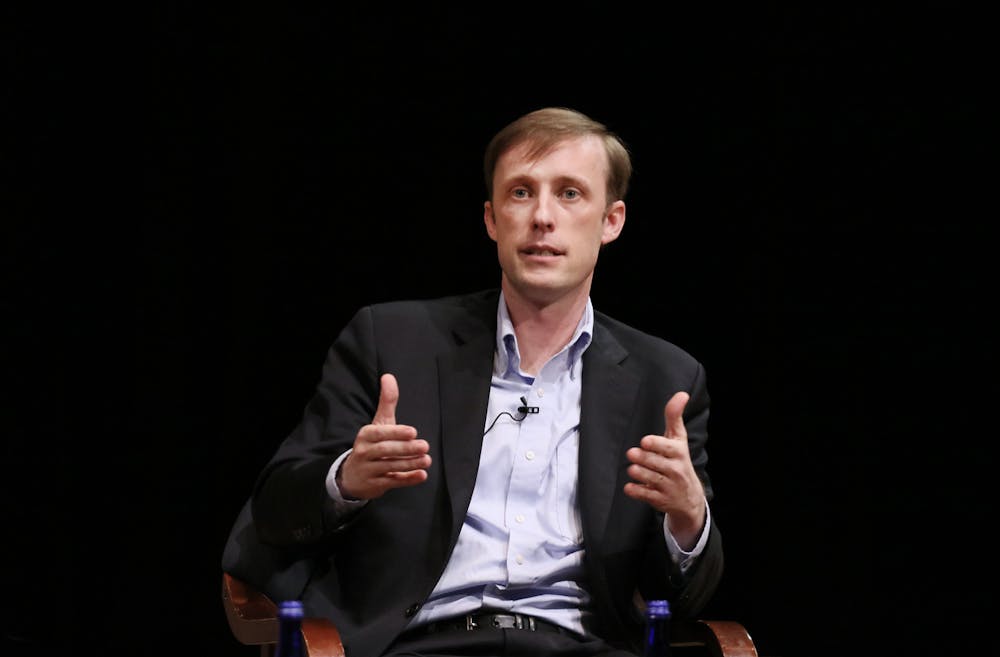National Security Adviser Jake Sullivan spoke with Duke students about the Biden administration’s current national security challenges and priorities for the year over Zoom Thursday evening.
The talk, hosted by the Sanford School of Public Policy’s Polis: Center for Politics, also featured Polis Distinguished Fellow and Ambassador Miriam Sapiro, who drew from her career in national security to interview Sullivan.
Sapiro opened the event by asking Sullivan about the surprises and challenges he has faced over the past year and how COVID-19 has changed the role of national security.
“So many things have surprised me,” Sullivan said. “In other ways, it feels like I’ve come back into the White House after a few years away and there’s all the same enemies and adversaries.”
Sullivan was also then-Vice President Biden’s national security adviser during the Obama administration. Many of the issues that vex Washington, D.C. today are continuations of long-standing issues: relations with China and Russia, economic crises and increased political polarization.
The ongoing battle against the pandemic, however, has changed the job in unfamiliar ways; vaccine diplomacy, for example, adds another layer of strategy in the balance of global politics.
“It’s like seeing the landscape through a different lens with brighter colors or sharper relief,” Sullivan said. Though former issues persist, they lay more bare with the effects the pandemic has had on geopolitical and transnational issues, he added.
Sullivan was then asked to reflect on some of his most challenging tasks during the Biden administration, and he was quick to find answers: the decision to pull American troops out of Afghanistan and the fight against climate change.
“The reason I use these two is because [Afghanistan] was a crisis, a hard-security challenge; but climate is, in a way, equally a crisis of such profound magnitude to our society,” Sullivan said.
Sullivan and his team faced criticism on their handling of Afghanistan, with some politicians calling for his resignation last September. And in the fight against global climate change, the United States rejoined the Paris Climate Accords in 2021 and fulfilled some of the promises of the Biden Administration’s Green New Deal.
Looking forward, Sullivan hopes to unite many of the world’s powerful nations to combat what he considers the three most serious threats to national security and global quality of life over the next several years: the pandemic, climate change and cyber warfare.
For the remainder of the session, Sullivan described the diplomatic situations between the U.S. and three nations: Iran, Russia and China.
Iran and the U.S. will be in talks about the Iran Nuclear Deal over the next several days.
“We are in a critical stretch to determine whether or not Iran is willing to come back to diplomacy, or if we are going to have to go down a different track,” Sullivan said.
Sullivan has a complicated relationship with China. While he does recognize the Chinese government’s human rights violations, Sullivan maintains that China is a force that he hopes to work with moving forward.
For Sullivan, healthy competition with China in economic sectors is entirely possible and easy to maintain in the long term without conflict, and he hopes that the two nations can support one another in resolving the issues he believes to be of “top priority” to the global community.
“We don’t spend enough time saying ‘How do we put the U.S. in a better position?,’” Sullivan said. “I think we should have the confidence and the optimism about our capacity to be able to try and consider better or best case scenarios.”
Sullivan then discussed international relations with Russia and the threat of war in Ukraine.
“I have long since given up trying to get inside the head of any other leader, including [Russian President Vladimir Putin],” Sullivan said. “Here’s what I can say from our side: we’re ready either way.”
Sullivan discussed a series of documents leaked to Spanish newspaper El País which detail an arrangement to ease tensions in Ukraine through agreements to lower U.S. missile firing capabilities in Eastern Europe.
Get The Chronicle straight to your inbox
Sign up for our weekly newsletter. Cancel at any time.
“I’d encourage all of the students to take a look,” Sullivan said. “I usually don’t encourage leaked documents.”
The course of action described in these documents is the best-case diplomatic solution to these escalations in Ukraine, he said. Sullivan currently has no intentions on imposing sanctions on Russia as a means of coercive diplomacy.
“What’s up to us is to be prepared to respond that we emerge under any circumstances stronger, more united with our allies, and more determined to ensure that our interests are protected,” Sullivan said.
Following the first round of questions, Sapiro began asking questions submitted by Duke students. Over 400 questions were submitted from the student body, according to Sapiro.
In response to a question about “common resolve” amongst the American people, Sullivan talked about the aftermath of the Jan. 6, 2021 Capitol riots. He explained that the weight of those events is still felt in meetings with world leaders to this day, and Biden hopes to restore the “soul” of the American people.
Sullivan spent the remainder of his time discussing his past experience, the decision-making process he made in joining government work and how he maintains motivation.
“This is a relentless job,” Sullivan said. “If I was over-indexed on the work side of a work-life balance, then maybe the next opportunity I take, I compensate with over-indexing on the life side.”
James Cruikshank is a Trinity first-year and a staff reporter for the news department.

